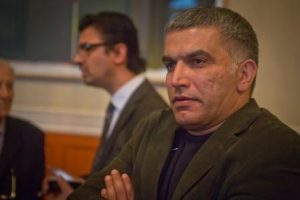President Donald Trump
The White House
1600 Pennsylvania Avenue, NW
Washington, DC 20500via emailDear President Trump,We are writing to you as journalists, press freedom organizations, and industry groups to express our deep dismay at the recent violence perpetrated against journalists in the United States as they have sought to report on mass protests across the country. On behalf of the 72 groups listed below, we urge you to speak out forcefully against these attacks and in support of the rights of journalists to report freely, as guaranteed by the First Amendment of the U.S. Constitution.
The United States’ history of protecting free expression and defending and protecting the rights of journalists is much admired beyond U.S. borders. This is born out of a recognition that journalists serve as independent monitors of social and political developments, and are essential to democracy, transparency, and accountability.
Attacks on journalists in the U.S. threaten to undermine this commitment. The U.S. Press Freedom Tracker has received reports of at least 320 violations of press freedom across the country since protests demanding an end to police brutality and calling for social justice broke out on May 26. It is vital that state and local government officials take steps to ensure such violations never happen again, and that the perpetrators are held to account.
We call on you to send a clear and unambiguous message across the country and around the world about the importance of the press freedom and work of the press. Local leaders need to hear unambiguously from you that they have a responsibility to fully investigate these attacks, protect journalists, and ensure that they can work unobstructed and without fear of injury or reprisal.
Press freedom in the United States is critical to people around the world. Thousands of foreign correspondents are based in Washington D.C. and throughout the U.S., where they are tasked with telling the story of America to their publics back home. The ability of journalists to work freely in the U.S. creates a more enlightened global citizenry.
What happens in the United States also has repercussions for journalists around the world, including American correspondents. When the U.S. backslides it sends a green light to authoritarian-leaning leaders around the world to restrict the press and the free flow of information.
Authoritarian regimes in China, Iran, and Turkey have already opportunistically spoken out about the heavy-handed police tactics used here, using the crackdown on the press in this country to legitimize their own repression of independent journalism.
Instead of condemning journalists and the media, we urge you to commend and celebrate them as the embodiment of the First Amendment, which is the envy of so many countries around the world.
Sincerely,
Acclaim Nigeria Magazine (ANM)
Afghanistan Journalists Center (AFJC)
Aliansi Jurnalis Independen (AJI) Indonesia
Americans for Democracy and Human Rights in Bahrain
Arab Reporters for Investigative Journalism (ARIJ)
ARTICLE 19
Associação Brasileira de Jornalismo Investigativo (Abraji)
Association for International Broadcasting
Bangladesh NGOs Network for Radio and Communication
Bytes 4 All
Cairo Institute for Human Rights Studies
Cambodian Center for Human Rights (CCHR)
Canadian Media Lawyers’ Association
Cartoonist Rights Network International (CRNI)
Centre for Law and Democracy
Centre for Media Studies and Peacebuilding (CEMESP)
Committee to Protect Journalists
Community Media Forum Europe (CMFE)
DW Akademie
Free Media Movement – Sri Lanka
Free Press Unlimited
Freedom of Expression Institute (FXI)
Fundación Gabo (Gabriel García Márquez Foundation)
Fundación para la Libertad de Prensa (FLIP)
Global Forum for Media Development (GFMD)
Global Investigative Journalism Network (GIJN)
Global Voices
Hong Kong Journalists Association
Independent Journalism Center
Independent Journalism Center (IJC)
Index on Censorship
Initiative for Freedom of Expression – Turkey (IFoX)
INSI – international News Safety Institute
Institute for Regional Media and Information
Instituto Prensa y Sociedad Venezuela
International Center for Journalists (ICFJ)
International Federation of Journalists
International Media Development Advisers (IMDA)
International Media Support (IMS)
International Press Institute
International Women’s Media Foundation
Internews
Media Focus International (MFI)
Media Foundation for West Africa
Media Institute Southern Africa – Zimbabwe
Media Matters for Democracy (MMFD)
Media Watch
Media, Entertainment & Arts Alliance (MEAA)
Metamorphosis Foundation
Newsgain
Norwegian PEN
Organized Crime and Corruption Reporting Project (OCCRP)
Pacific Islands News Association (PINA)
Pakistan Press Foundation
Palestinian Center for Development and Media Freedoms (MADA)
PEN America
PEN International
Press Union of Liberia
Project Syndicate
Pulitzer Center on Crisis Reporting
Reporters Without Borders
Rory Peck Trust
Rural Media Network Pakistan
Samir Kassir Foundation – SKeyes Center for Media and Cultural Freedom
SembraMedia
Social Media Exchange (SMEX)
Somali Media Women Association (SOMWA).
South East Europe Media Organisation (SEEMO)
South East European Network for Professionalization of Media (SEENPM)
The Center for Independent Journalism, Romania
World Association of Community Radio Broadcasters (AMARC)
World Association of News Publishers (WAN-IFRA)
CC:
Vice President Michael R. Pence
Kayleigh McEnany, White House Press Secretary Ambassador
Kelly Craft, U.S. Permanent Representative to the United Nations

